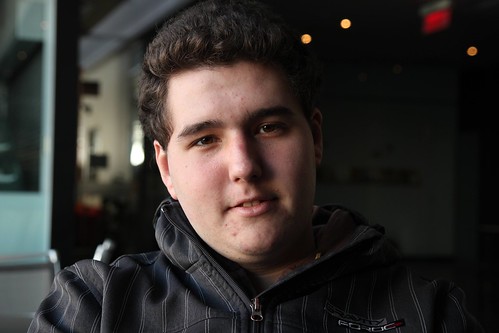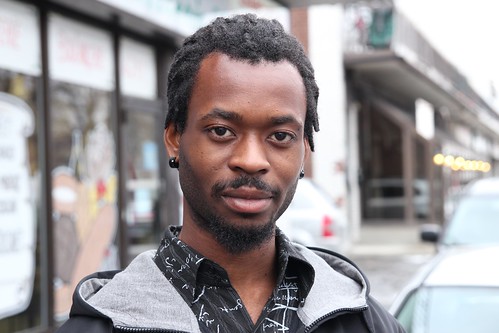Danny Raymond, Alex ‘Breezy’ Bryson, Mikerson ‘Swagga Kid’ Stiverne and his older brother Michael ‘da Prince Stiverne.
Tag: Canal D
I LOVE DOCS : GETTING THE MESSAGE OUT

Former judge Andrée Ruffo speaks out for docs.
A recent Vancouver Sun article sums up the crisis of the long-form documentary in Canada. Cutbacks everywhere, shrinking budgets and most of all diminishing broadcast windows. Outside of the National Film Board and the arts councils, the whole Canadian funding system is based on acquiring a broadcast license. That’s the key which opens the door to other funding agencies. As networks turn increasingly to entertainment-oriented, cheap-to-produce ‘reality shows’, there is less space and less money for the kinds of docs that investigate and question the real world instead of inventing hokey competitions and survival challenges.
A March 2011 report from the Documentary Organization of Canada examined these trends, showing there had been a six-year decline in doc funding. The situation is worse in English Canada than in Quebec, because this province actually has a cultural policy, a real film culture and some invaluable institutional support notably from SODEC. In addition to the public broadcasters the Astral-owned ‘Canal D’ puts serious money into a handful of long-form documentaries every year.
Nonetheless, the most creative response to the crisis has come from Montreal. A small group of filmmakers, calling themselves ‘Documentary’s G7’, some of them members of DOC’s Quebec chapter, have created a campaign called ‘J’aime le Documentaire’ – I love docs. In addition to using social media for networking, they have made a series of ten public service messages for use on television, during festivals and on the web. These ‘spots’ – quite elegantly made in black-and-white by experienced ad director Richard Leclerc on a minimal budget – feature well-known Quebecers who state their heartfelt support for documentaries. Drawn from a wide spectrum, they include among others singer Chloë Saint-Marie, human rights lawyer Julius Grey, and – cleverly – politicians or former politicians from every major political camp in Quebec. ‘They may disagree on everything else’ says G7 member Patricio Henriquez, ‘but they all agree documentaries have a key role to play in the way we perceive social and political developments and issues. This shows that documentaries can have a unifying effect in society, at least here in Quebec.’ In addition, people who were attending the Rencontres doc fest last November were invited to state their support for the form, resulting in another slew of passionate statements for use on the web.
The ‘I love documentary’ campaign is supported by a series of industry organizations and networks as well as Canal D which has been broadcasting the spots since before Christmas. The ads will also be shown before some films (fiction and documentary) at the upcoming Rendez-vous du cinema québecois.
Thanks to Sally Rylett for help with this blog post.
Montréal-Nord – les jeunes
Je vous ai déjà parlé de mon tournage en cours à Montréal-Nord. C’est donc pour un film produit par Jeannine Gagné à Amazone films qui sera diffusé à Canal D. Le processus de ‘casting’ a été long, mais voici mes trois ‘personnages’ principaux, que nous suivons pendant un an et quelques mois.
Danny Raymond est un jeune homme intelligent qui a des talents de ‘leader.’ Il est plein de projets, mais il ne sait pas comment les réaliser. Ayant vécu dans des foyers de groupe et des familles d’accueil pendant une bonne partie de sa jeunesse, il a beaucoup manqué d’encadrement. Il a décroché de l’école avant de finir son secondaire parce qu’il ne se sentait pas accepté et n’étais pas motivé. Il vit encore chez sa mère qui a déjà été contorsionniste au cirque, alors que son père – qu’il voit maintenant quelques fois par année – était clown avant de devenir plombier.
Danny vient d’avoir 18 ans. Il a récemment été accepté pour un projet au Carrefour Jeunesse Emploi. Danny adore la musique et il participe activement à Musique X, un projet communautaire que nous avons suivi depuis ses débuts. Il adore aussi faire de la bicyclette. Les amis sont très importants pour lui, et nous les filmons souvent ensemble.
Michael Stiverne est venu d’Haïti avec son père lorsqu’il avait 10 ans, alors que sa mère est restée là-bas. Le père, chauffeur de taxi au centre-ville, l’a laissé se débrouiller seul et s’occuper de son jeune frère Mickerson. A 22 ans Michael est un jeune homme responsable et motivé, qui a été très apprécié au programme ‘2e Chance’ des Fourchettes de l’Espoir, un organisme communautaire.
Mais il n’a pas toujours été si sage: plus jeune il a été inculpé pour possession d’armes, vols de voitures et trafic de drogue, et il en paye maintenant le prix. Il passe ses fins de semaine en prison, et le restant du temps à se chercher un emploi. Ce qui, pour un jeune noir de Montréal-Nord avec un casier judiciaire n’est pas facile!
Il passe des entrevues de manière assidue, et les employeurs potentiels promettent de le rappeler – mais ne le font presque jamais. Mikerson, 18 ans, a été mis dehors de son école parce qu’il ‘causait du trouble,’ mais comme son frère il est très motivé et essaye de s’en sortir. Il compose de la musique et il chante.
L’absence des parents l’a beaucoup fait souffrir, et il exprime cette douleur de façon touchante. Dans le film nous le verrons notamment raconter l’histoire de sa vie sous forme de rap.
Alexandre Bryson, 17 ans: ‘La violence, la drogue, les coups de feu, j’ai connu ça très jeune, ça ne m’intimide pas,’ dit Alex. Il a grandi à Pointe-aux-Trembles, parfois chez son père, parfois chez sa mère. Ils déménageaient souvent, et au primaire, il a souvent changé d’école. Dès sa jeune enfance, sa mère – d’origine MicMac- est devenue dépendante de la drogue et s’est même prostituée. A l’âge de 12 ans – le jour de son anniversaire – Alex est parti vivre avec son père. Mais lorsque celui-ci est parti travailler en Alberta, Alex s’est retrouvé en foyer d’accueil.
Alex a aimé l’école, et il avait de bons résultats au secondaire, mais l’instabilité de sa vie familiale l’a amené à décrocher après la deuxième année. Il a pris de la drogue, mais l’exemple de son frère ainé qui est accro et qui a fait de la prison l’a convaincu de laisser tomber. La personne qui l’a le plus influencé, en lui disant ‘tu vaux plus que ça’ c’est sa grand-mère paternelle – qu’il aime beaucoup, mais qu’il admet négliger.
Alex est maintenant de retour chez son père, à Bois-des-Filion. Mais il passe souvent du temps à Montréal-Nord. Intelligent et articulé, Alex passe surtout son temps à improviser du rap, ce qu’il fait très bien, seul ou avec des amis. Il a eu 18 ans le 12 juin 2011. Il a été accepté par le programme Katimavik, et ira passer 6 mois à l’Île du prince Edouard et en Ontario à partir de juin.
Merci à Tobi Elliott pour son aide avec le blogue.
“You Don’t Like The Truth”

The director of programming of the Festival du Nouveau Cinéma, Claude Chamberlan, had a question for the programmers of the Toronto and Vancouver film festivals: “Why did they turn down the amazing and crucial film You Don’t Like the Truth – Four Days Inside Guantanamo ?”
“I know them well,” he said, “and I wouldn’t have cared if they had shown the film first. I just want them to give me an answer.” He then introduced the directors of the opening film of this year’s Focus Québec-Canada section, my friends Patricio Henriquez and Luc Côté.


The film is about the shocking case of the young Omar Khadr, the 24-year old accused of terrorism and killing an American soldier, who has been imprisoned for seven years, most of that time in Guantanamo. I will not summarize the case and describe this moving and incisive film in any detail, because I would not do as good a job as Cinema Politica’s Ezra Winton – read his article on the Art Threat blog.
Suffice it to say that the film is a deconstruction and analysis of the surveillance camera video of the seven-hour, truly revolting –Orwellian more than Kafkaesque– interrogation of Khadr by representatives of CSIS, the Canadian Security Intelligence Service.
Ezra is right in pointing out that we all have a share of responsibility for what the Canadian government is doing to this young man, a child soldier at the time of the events. You can only leave this film with a sense that something has to be done, even though Khadr’s lawyer explained at the launch that he is stuck between the devil and the deep blue sea.
Indeed, it seems – in the bargaining going on right now – that he will have to choose between pleading guilty to a crime he didn’t commit and continue serving time in prison, or rot in his cell in Guantanamo (the facility Obama promised to close!) forever. Amnesty petition here.
The film will screen at the Royal Cinema in Toronto and at the Cinema Parallèle in Montreal starting Oct. 29th.
Since the film premiered, Patricio and Luc have been caught up in a whirlwind of activities, including a repeat screening of the film at the 700-seat Imperial Cinema where it premiered, and an upcoming screening on Parliament Hill in Ottawa. They nonetheless took the time to answer a couple of questions:
When we watch the film, the concept comes across so clearly and the structure seems so simple, so obvious. But during your process of creation…?
PATRICIO: The chronology in the shooting of a documentary doesn’t always provide an interesting dramatic structure. Often in the editing room you need to betray this chronology to give meaning to the images. Of course, in this case, we weren’t the ones who filmed the interrogation of Omar Khadr at Guantanamo by the Canadian secret police. Nevertheless, the seven hours of video recorded over four days in February 2003 (accessible to the public thanks to a decision by the Supreme Court of Canada in 2008) had a progression that we kept in our film.
Luc, our editor, Andrea and I, we watched these seven hours – of very poor technical quality – several times. We quickly discovered that each day had its own specific, separate nature. So we decided to identify each day as a journey: Day 1: Hope. Day 2: Fallout. Day 3: Blackmail, Day 4: Failure. Also, we understood we would need some context for these four days. So we directed our research toward eyewitnesses, people who had seen Omar, experts (scientific and legal), objective observers such as the Toronto Star reporter Michelle Shephard, and politicians. All these people had to help us better understand what played out during this four-day interrogation.
Andrea first edited together the interrogation in this order, and then we showed all the participants the passages they could appropriately illuminate for us in interviews. Then, we inserted these new elements into the structure of the interrogation. And voila, it wasn’t a very complex creative device.

Having followed this story for several years, how do you evaluate the media’s coverage of Khadr’s case?
PATRICIO: In Quebec, the coverage was particularly lacking. To my knowledge, the first print media to send a journalist to Guantanamo was Rue Frontenac, the website of the locked-out journalists of the Journal de Montreal. That’s totally to their credit.
Elsewhere, they trafficked in misinformation. One example: in a report aired Nov. 13, 2009, a Téléjournal correspondent in Washington said this of Omar Khadr: “He has already spent over seven years in Guantanamo, waiting for his trial for the murder of an American MILITARY DOCTOR.”
There are two grave errors in this communication. The 1st Class Sergeant Christopher Speer, in whose death Omar Khadr is allegedly implicated, had never been a military doctor. At the start of the proceedings against Khadr, the Pentagon stated (perhaps not innocently) that the victim had been a medic (‘un infirmier’ or ‘un brancardier’ in French.) The Radio-Canada reporter translated badly, calling him a “doctor.”
But even worse: Omar Khadr’s lawyers have proven since 2004 that the Pentagon has held back the fact that, in reality, Sergeant Speer was in Afghanistan as a member of the special forces known as Delta Force. And although he had been trained at one point as a medic, his primary role in Afghanistan was not to heal, but to kill.
This difference is doubly loaded with consequences for Khadr, because, according to the laws of war, killing a duly identified nurse or medic is a war crime. Therefore, probably more by negligence than in bad faith, Téléjournal reinforced all the same this idea that Omar had committed a war crime in killing a medical doctor. It’s not a shock then that public opinion, having fallen victim to similar misinformation, is still largely indifferent to the fate of Omar Khadr.
Then, we realized that practically every media in Quebec and in Canada has been content to merely reproduce the most emotional part of these seven hours of recorded video, the moment where, yielding to the psychological pressure of the Canadian secret agents, Omar cracks and falls into a depressed state, crying uncontrollably. No one seems to have taken pains to listen to the tapes in their entirety.

We do understand that journalists, working constantly under pressure, haven’t had the time to decode the material. This is where, sometimes, the documentary can be useful in supplementing, more calmly and later on, the picture of a certain reality.
How did you manage to finance the film?

LUC: Financing this film hasn’t been very easy. After being refused by broadcasters and public institutions, we went to Jean-Pierre Laurendeau and Sylvie de Bellefeuille at Canal D. Without hesitation they agreed to give us a license. With this license, we had access to tax credits. But there still remained an immense hole in the budget of 50 per cent. One of my best friends, Kevin Kraus, who closely follows our work, offered to lend us money. So we went ahead by investing our salaries, our equipment, etc. For lack of resources, all of the filming – camera, sound and interviews – was done by Patricio and myself alone.
Thanks to Tobi Elliott for her help with this blog.



